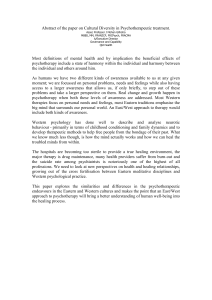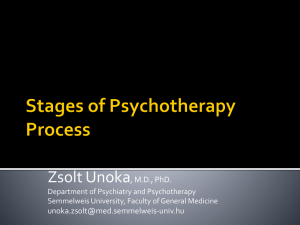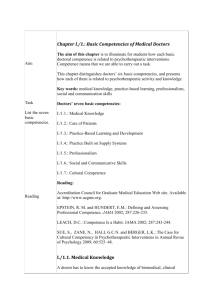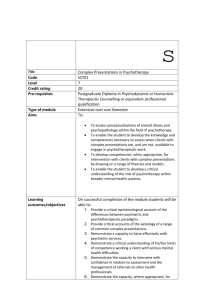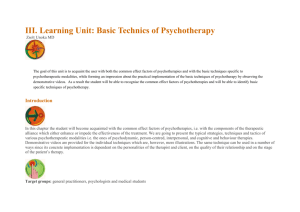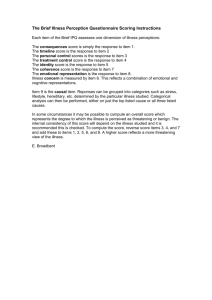Gabbard, GO, Beck, JS, Holmes, J. Oxford Textbook of
advertisement
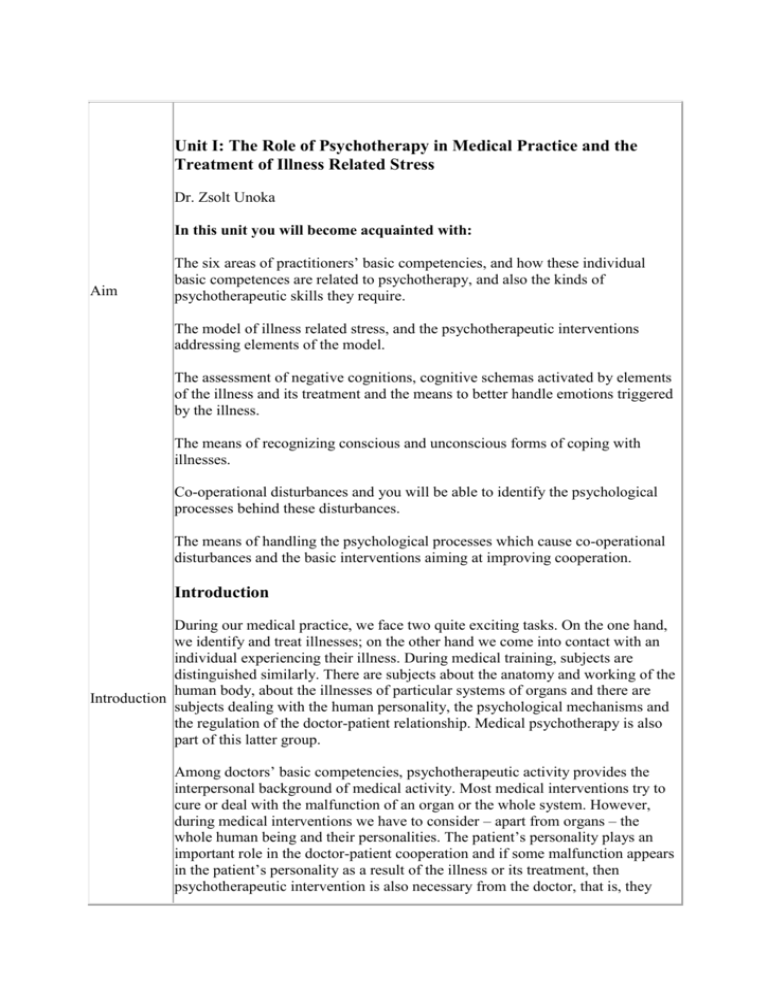
Unit I: The Role of Psychotherapy in Medical Practice and the Treatment of Illness Related Stress Dr. Zsolt Unoka In this unit you will become acquainted with: Aim The six areas of practitioners’ basic competencies, and how these individual basic competences are related to psychotherapy, and also the kinds of psychotherapeutic skills they require. The model of illness related stress, and the psychotherapeutic interventions addressing elements of the model. The assessment of negative cognitions, cognitive schemas activated by elements of the illness and its treatment and the means to better handle emotions triggered by the illness. The means of recognizing conscious and unconscious forms of coping with illnesses. Co-operational disturbances and you will be able to identify the psychological processes behind these disturbances. The means of handling the psychological processes which cause co-operational disturbances and the basic interventions aiming at improving cooperation. Introduction During our medical practice, we face two quite exciting tasks. On the one hand, we identify and treat illnesses; on the other hand we come into contact with an individual experiencing their illness. During medical training, subjects are distinguished similarly. There are subjects about the anatomy and working of the human body, about the illnesses of particular systems of organs and there are Introduction subjects dealing with the human personality, the psychological mechanisms and the regulation of the doctor-patient relationship. Medical psychotherapy is also part of this latter group. Among doctors’ basic competencies, psychotherapeutic activity provides the interpersonal background of medical activity. Most medical interventions try to cure or deal with the malfunction of an organ or the whole system. However, during medical interventions we have to consider – apart from organs – the whole human being and their personalities. The patient’s personality plays an important role in the doctor-patient cooperation and if some malfunction appears in the patient’s personality as a result of the illness or its treatment, then psychotherapeutic intervention is also necessary from the doctor, that is, they have to deal with the patient’s psyche, emotions and mind. During medical practice, patients’ personalities are influenced by doctors’ personalities. The physician’s personality is part of their medical repertoire of healing tools. Throughout the medical career, we can observe continuous development in doctors’ personalities. However, having just graduated at university, not everyone is ready yet for the particularly stressful medical training involving traumatic events. Physicians themselves often need psychotherapeutic support, when they alone cannot cope with the psychological burden of their medical practice. As a physician’s own personality is one of his healing tools, it has to be developed continuously. The means to reach this goal are: therapy based on self knowledge, Bálint groups, and regular discussion of cases with colleagues experienced in dealing with psychological issues. As the occurrence of mental disorders is extremely frequent among practitioners, occasional requests for specialist psychotherapeutic help or visits to psychotherapists may help to prevent the problems getting too serious. PHILOSOPHY MASTER: … there is no other way to express oneself than with prose or verse. MONSIEUR JOURDAIN: There is nothing but prose or verse? PHILOSOPHY MASTER: No, sir, everything that is not prose is verse, and everything that is not verse is prose. MONSIEUR JOURDAIN: And when one speaks, what is that then? PHILOSOPHY MASTER: Prose. MONSIEUR JOURDAIN: What! When I say, "Nicole, bring me my slippers, and give me my nightcap," that's prose? PHILOSOPHY MASTER: Yes, Sir. MONSIEUR JOURDAIN: By my faith! For more than forty years I have been speaking prose without knowing anything about it! (II.4.) Moliére: The Middleclass Gentleman (1670) (Translated by: Philip Dwight Jones) During their medical practice, physicians carry out several psychotherapeutic interventions. The aim of the term is for students of medical universities, future physicians to know that during a greater part of their work, they work as psychotherapists, and this aspect of their medical practice should be dealt with not just instinctively, but consciously, with a specialist’s repertoire, and awareness of possible areas for progress and with greater and greater expertise. As a result of our training, we hope doctors will not be like Moliére’s middle class gentleman, Mr Jourdain, who realizes that he had been talking in prose for forty years without knowing what it is, like a senior doctor entering into psychotherapeutic training, realizing that they had been practising, or could have practised psychotherapy for decades, but did not realize what they had been doing. Psychotherapy is taught by various methods. Didactic training: the basics of psychotherapy are taught Practice: Interventions are drilled through role-plays Progress is continually measured by e-tests Trainees are given empathy-raising tasks, in which they assess emotional states presented in pictures and stories. Aim The effects of psychotherapeutic training on doctors: Psychotherapeutic training affects the physician as a person. In the psychotherapeutic activity, doctors’ whole personalities are involved; they use their personalities as healing tools. During training doctors acquire knowledge that may affect their self knowledge and self image. They can learn new social skills that may change their behaviour. Doctors have to learn the skills of empathy, the differentiated perception and definition of their own emotions, the ability to distinguish own and others’ internal processes, improvement of emotional control, the ability to make rational decisions under pressure, the understanding of psychological mechanisms. Recommended learning methods: Read the texts together with the linked dialogues. Then answer the comprehension questions. If you cannot answer all the questions, refer back to the problem areas in the text again. Then do the self-check test. The course consists of two separate parts, which may be studied on their own: Parts I./1.1.-I./1.6. together as a whole, and then parts I./2.1. - I./2.10.1. together. Total learning time required: 6 hours Recommended Reading Important Gabbard, G.O., Beck, J.S., Holmes, J. Oxford Textbook of Psychotherapy. Oxford University Press, 2007 Contents of the Unit: I./1. Doctors Basic Competencies I./1.1. Medical Knowledge I./1.2. Looking after Patients I./.1.3. Practice-Based Learning and Development I./1.4. Practice Built on Supply Systems I./1.5 Professionalism I./1.6. Social and Communication Skills I./1.7. Cultural Competence I./2. Psychological reactions to illnesses and their psychotherapeutic treatment I./2.1. Stress Resulting from Illness Reading I./2.2. Stress Resulting from Illness and Different Personality Styles I./2.3. Illness and Cognitive Schemes I./2.4. The Meanings and the Model of the Illness I./2.5. Coping Strategies: conscious behavioural forms of fighting with stress resulting from illness I./2.6. Defence mechanism: unconscious forms of coping with stress resulting from illness, I./2.7. Emotional Response to Illness I./2.8. Behavioural response to stress resulting from illness I./2.8.1. Adaptive response I./2.8.2. Maladaptive Behavioural response I./2.8.3. Reasons of Non-Compliance to Treatment I./2.8.4. Mental Disorder related Non-Compliance I./2.9. Interventions Facilitating Compliance I./2.10. The most frequent causes of terminating clinical treatment despite doctor’s advice I./2.10.1. Avoiding the termination of clinical treatment despite doctor’s advice using psychotherapeutic tools
